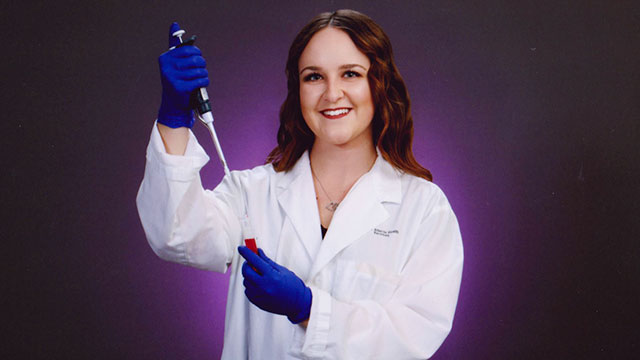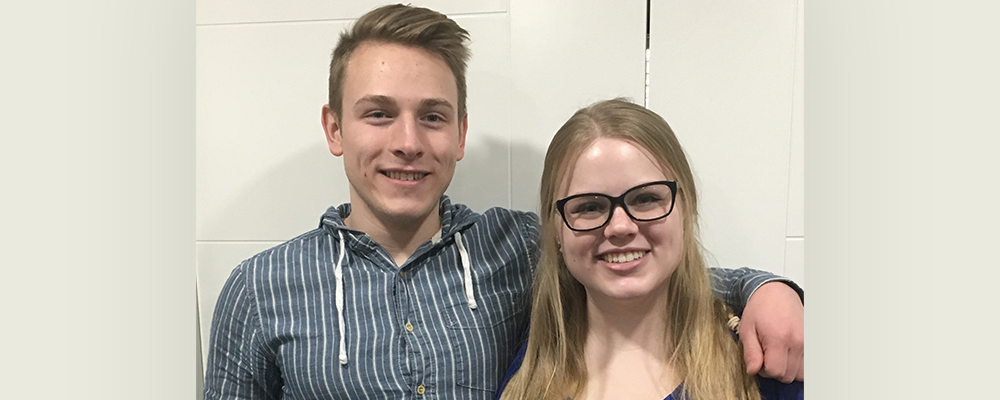
Kallie Rozak, who is graduating this week from the Medical Laboratory Science program, is proud of being a behind-the-scenes health-care hero.
Taylor Ormann, '20 BSc, always knew she wanted to work in medicine. As a high school student in Olds, Alberta, she relished the exposure summer camps offered to possible future careers from transcriptionist to family doctor, but as she graduates the Faculty of Medicine & Dentistry's Medical Laboratory Science program this month, she's confident in the choice she made.
"As lab professionals, we aren't on the front lines, and I'm OK with that," says Ormann. "We're kind of the unsung heroes, but we're 70 per cent of the diagnostic process."
Classmate and fellow graduate Kallie Rozak, '20 BSc, agrees. "Science was always something I was passionate about," she says, "and I always knew I wanted to work in health care, but not directly with patients." While she briefly considered NAIT, Rozak knew the University of Alberta's program was the most promising path to the work she was most interested in.
Rozak and Ormann are departing their demanding degree program with cherished memories of their courses and their community. It's an intimate group, with only about 23 in the graduating class, says Ormann, and during the students' clinical practicum, that closeness grows as students are placed together in groups of up to six. Some of Ormann's fondest memories-besides the Twister mat in the student lounge that got a lot of use during breaks-involve the debriefing lunches her cohort would enjoy together after each rotation. Rozak's cohort was even smaller due to a couple of early departures from the program. "There were only three of us and we got so close," she recalls. "Having that relationship was really nice."
Coping with COVID-19
Because of the program's close-knit feel, it was particularly shocking to both Rozak and Ormann to live out the final months of their degree in the relative isolation brought on by COVID-19. Not only did they lose the ease of seeing their classmates every day, but they also had academic challenges to withstand. Ormann was two days away from finishing a class project when all non-essential research was put on pause, and Rozak recalls the added technical challenges of presenting final projects online. Completing the degree has felt a bit "anticlimactic," says Ormann. It's hard to grasp it's over when you write your final exam in your PJs, online, alone in your room, she adds with a laugh.
Still, Rozak is optimistic there will come a day-perhaps even this summer-when the Class of 2020 can gather for the celebration she and her fellow graduation representative had been planning before the pandemic turned the world upside down. Dressing up to enjoy a buffet dinner and photo-booth antics together in a popular Whyte Avenue restaurant will have an extra sweetness to it if everyone is able to gather at a later date.
While the global pandemic certainly altered the final months of their schooling, it also served to throw a spotlight on the often-unsung work of laboratory professionals, says Rozak. "You look at the numbers, and the only reason we know who has it is because of the lab techs," she says. "It brings pride to all of us in the field and opens people's eyes to what we do."

Since the loss of her older brother Mitchell to suicide in 2018, MLS graduate Taylor Ormann has become a fierce advocate for mental health both within the program and in her larger circles.
Photo: supplied
Honouring lost loved ones
While both express a deep pride in having completed their degree, it's a bittersweet moment for Rozak and Ormann, both of whom lost close family members while in school. Rozak's mother died suddenly a week before she started her second-year practicum, in July of 2018. Her mother had been her greatest cheerleader, she says, always there to listen proudly to stories about her day. While she briefly considered postponing the practicum till September, she chose to stay with her group. "Everyone told me my mom would want me to go back," she remembers.
For Ormann, graduation holds a particular poignancy as well. She lost her older brother Mitchell to suicide the day of her microbiology final exam, while she was in the midst of her clinical practicum in the fall of 2018. Like Rozak, she thought about taking time off her studies to grieve, but in the end knew that for her, the structure of school and her dedication to her future career would bring her the solace she needed. She drew strength from close friends in the program and the therapist she had been seeing for her generalized anxiety disorder.
Advocating for a better future
Saddened by the ongoing stigma around the subject, Ormann has since become a passionate advocate for mental health. Last fall, she spoke to the incoming students in her program about the importance of taking care of themselves during times of stress and anxiety. "I don't want people to suffer the way my brother suffered," she says. "I have asthma; I'm not afraid to tell you I have asthma. I have a generalized anxiety disorder, so I take medication and I see a therapist and I'm not going to be ashamed of that. I want to help people find a way to be comfortable with this. And I want people to know they have somewhere to go."
The importance of self-care is a message Ormann also wants to share with those students entering the program this fall under challenging circumstances. "I want them to know they always have somewhere to go, and that they should talk to someone if they need help." A key piece will be building a strong support network, adds Rozak. "Make friends online even if you can't meet in person right away," she stresses, since most classes will be delivered remotely. "Although it may seem hard at times, everyone is there to help you."
Seeking career satisfaction
Both Ormann and Rozak are now in the process of preparing for their certification exam, which happens near the end of June. They say COVID-19 has made the job search a little more difficult, as many labs are not currently hiring. Rozak is thankful for her casual job as a lab assistant with DynaLIFE, a job she's had since starting her degree. But she looks forward to contributing her expertise whenever an opportunity presents itself. "I would take a job anywhere to get my foot in the door," she says.
Meanwhile, Ormann has been applying for work that will allow her to remain close to home. Being near her parents in Olds is important to her, after seeing the pain they endured at losing her brother.
For now, the future can wait while both young women take a moment to savour their accomplishments, sharing them with their loved ones who remain and those they have lost.
"My mom would have been so proud," says Rozak. "I know she's watching."